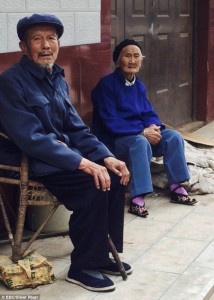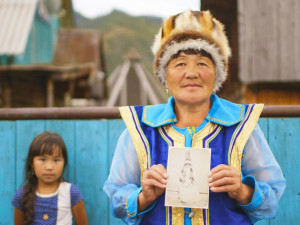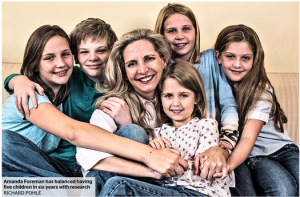Charlotte Hodgman is joined by historical author Amanda Foreman to discuss her new BBC2 TV series The Ascent of Woman.
Since ancient times, the desire for gold has had a way of turning human beings into monsters of greed. The Greek god Dionysus granted the mythical King Midas the golden touch, but only after the king had inadvertently turned his daughter into gold—and realized that he himself would starve to death—did he see his wish as a curse. The Roman poet Virgil wrote in “The Aeneid,” “Accursed thirst for gold! What dost thou not compel mortals to do?”
The alleged discovery last month in Poland of one of the lost Nazi “gold trains” is a case in point. Missing from the excitement over the train—supposedly dispatched at the end of the war (and buried since then), with millions of dollars worth of stolen loot, gold bars and armaments—is acknowledgment that this so-called treasure is the effluence of evil.
Prospectors have flooded the area where the train is said to be. Last week, regional authorities sought the help of the Polish army, as if to prove the famous line in John Huston’s 1948 film “The Treasure of the Sierra Madre”: “When the piles of gold begin to grow…that’s when the trouble starts.”
By Lucy Waterlow
A Chinese woman has revealed how she endured having her feet bound when she was only six years old, even though the painful procedure had been outlawed.
Wang Huiyuan, now 84, who lives in the rural Tonghai County, Yunnan, had the ‘beauty treatment’ in the 1930s, decades after it had been officially banned in 1902.
‘Then it was fashionable to bind feet. Everyone did it. If not, you’d be laughed at, “look at her big, flat feet”. Once I was laughed at, I bound my feet,’ she explained to Dr Amanda Foreman on BBC documentary The Ascent Of Woman.
The octogenarian recalled how the process of binding her feet to make them smaller – an ancient practice that can be dated back to the 13th century – was unbearably painful.
Dr. Amanda Foreman discusses her BBC Two series on the history of women with Jane Garvey.
Despite women’s liberation and the global rise of feminism, there is still a clear gender imbalance in politics. Which is odd since there is so much evidence that women would do it better.
If women were in charge, the refugee crisis in Europe might have played out a little differently, argued the historian Dr Amanda Foreman this weekend. ‘It’s not in the female make-up to stand there idly by while women and children die like flies on the beach.’ This, she said, is why Germany’s chancellor Angela Merkel has been most compassionate towards the desperate families seeking a new life, and has argued for a shared housing responsibility between nations.
Making a stable home for Syrians so they do not have to flee seems beyond reach, but can it be done by negotiating with ISIS? Tim Cross, Kevin Maguire, Dr Amanda Foreman, and Haras Rafiq discuss.
The first words I say in The Ascent of Woman are: “There has never been a better time to have been born a woman.” I believe this to be true in aggregate and in particular for women in America. By every measurement we are either gaining on or are ahead of men. Since 2011 women have made up half the American workforce and the majority of the country’s graduates. But if we are getting our cake at last, guess what: we aren’t eating it, too.
When I was growing up, the message was that girls can do anything that boys can — and probably better. I don’t think it was meant to be a prophecy but it’s rather turned out that way. In America today the average undergraduate ratio is 57% women to 43% men. That’s the average, mind you. In some places it’s even worse. At Sarah Lawrence College, where I was a student, it’s more like 70-30.
Outside universities the gender gap isn’t much better. Among young adults with degrees there are five women for every four men. In some cities such as San Francisco, which is full of computer geeks and engineers, the imbalance is hardly noticeable. But others have turned into man deserts, especially for female graduates between the ages of 25 and 34.
Religion and men are at the root of the world’s problems, the presenter of a new BBC series tells Alice Thomson.
If we had a more matriarchal society and women were in charge the refugee crisis would not have happened in the way it has, according to the historian Dr Amanda Foreman. “Women looked at that picture of the little dead refugee boy still in his shoes and thought: ‘Not in my name’. It’s not in the female make-up to stand there idly by while women and children die like flies on the beach. Angela Merkel is the one who can’t stomach it but most male politicians think purely in terms of politics.”
Women’s power, or lack of it, is on her mind right now, not least because she is presenting the BBC’s four-part series, The Ascent of Women, which began this week. The mother of four girls, Helena, Halcyon, Xanthe and Hero, and one boy, Theodore, she has been determined to prove that the female of the species has not been an irrelevance, “just there to hang out the washing”.
She has had an astonishing career since coming to Oxford to study Georgiana, Duchess of Devonshire, then an obscure socialite, for her PhD. “All the crusty men thought I was this mad, ditzy girl writing about this trivial woman,” she recalls. But the thesis became a bestselling and award-winning biography, which in turn became a film starring Keira Knightley. It was followed by an equally impressive and weighty book on Britain’s involvement in the American Civil War.
By James Delingpole
Finally I realise why women are so pissed off. It all goes back to the first codified laws — circa 2,400 bc — when rules like this were invented by men: ‘If a woman speaks out of turn then her teeth will be smashed by a brick.’ Before that, apparently, women lived on a pretty equal footing with their future male oppressors. Indeed, in arguably the first civilisation — a hive-like collection of houses in central Anatolia called Çatalhöyük dating back to 7,500 bc, when mankind was just beginning to emerge from the Stone Age and living with semi-domesticated animals — not a single man was expected to put out the bins while the women dealt with the easy tasks like cooking, washing, child-rearing, ironing, cleaning and leafing through holiday brochures.
That’s because everything was shared equally. Everyone’s house was the same size and everything, including children, was common property. Once you’d given birth, your child would be handed over to the neighbours and they’d bring it up in their household. This bound everyone together in communal loyalty and affection and peace, over 9,000 years before John met Yoko and wrote ‘Imagine’.











